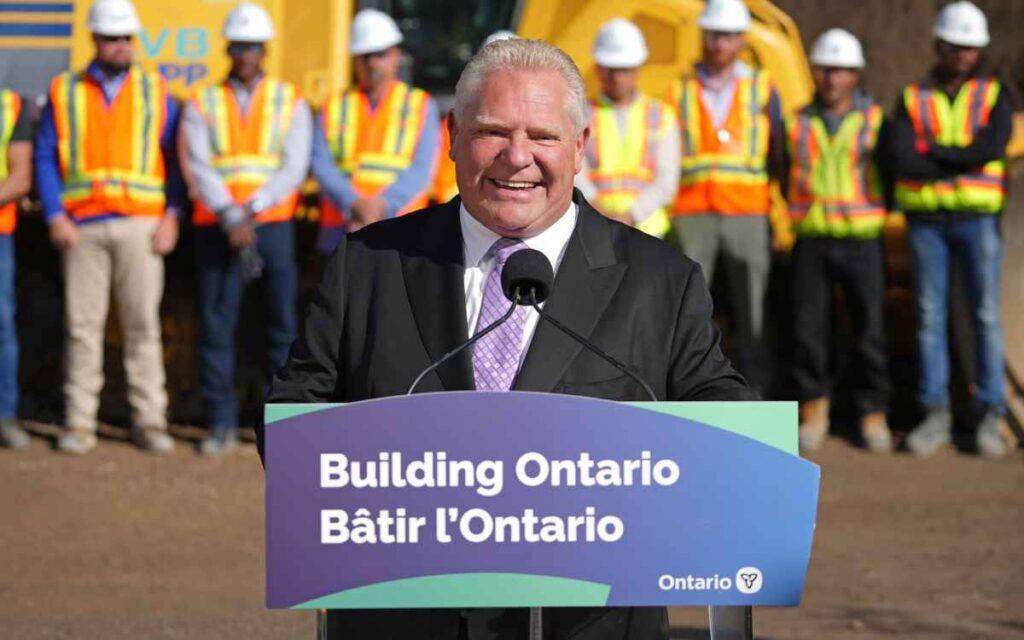
The Ford government has done little to improve things from the previous Liberal record. Pictured: Premier Doug Ford. Photo Credit: Doug Ford/X.
The Ford government in Ontario has been bragging about various aspects of the provincial economy recently, claiming their so-called “open for business” policies have fostered employment growth and attracted new businesses to the province. The recent Ontario Fall Economic Statement included a promise to refund $200 to every Ontario taxpayer and eligible children as government revenue was reportedly higher than expected. This rebate is estimated to cost a total of $3 billion at a time when the province is still mired in debt and running a significant deficit.
Yet an examination of the facts suggests that the Ontario economy is far from healthy and that the Ford government has done little to improve things from the previous Liberal record. A Fraser Institute study that was released earlier this week demonstrates that, in fact, the performance of the Ontario economy in recent years has been one of the worst in Canada, and has lagged that of Quebec, which is more typically viewed as an economic underperformer.
The Fraser Institute analysis showed that real per-capita Gross Domestic Product (GDP) – a reliable measure of standard of living – grew annually by about 1.2 per cent in Quebec from 2000 to 2022, as compared to 0.7 per cent in Ontario. And both of these provinces, which together represent more than 60 per cent of Canada’s GDP, register growth below the Canadian provincial average. In 2000, Ontario’s per capita GDP was the second-highest among the provinces but had fallen to fifth by 2022.
The study also noted that Ontario registered a budget deficit during the 2000 to 2022 period in 19 of the 24 years studied, as compared to 14 out of 24 years for Quebec, and that Quebec has lowered its net debt-to-GDP ratio substantially over the last decade while Ontario’s has remained stagnant at about 40 per cent. Both provinces continue to face productivity challenges, which will limit their future growth unless changes are made. As these provinces represent more than half of national GDP, their problems also affect the country as a whole.
The Ontario Progressive Conservative government can rightly blame much of this bad news on their Liberal predecessors, yet has done little if anything to change course since they came into power in 2018. The Ford government has been politically clever in targeting some limited tax and fee reductions that are very visible to Ontarians to give the impression they are making progress on improving the cost of living. For instance, they eliminated the auto licence plate renewal fee and the need to have an up-to-date sticker for vehicles. This was more of a nuisance than a big cost factor for Ontarians, but was nevertheless a welcome change.
The Progressive Conservatives also introduced a gas and fuel tax cut in 2022 that they have recently extended through until June 30, 2025, for savings per household estimated at just under $400 annually. Although any tax or fee reduction is welcome in overtaxed Ontario, the Ford government has not made any significant moves to reduce the most important taxes such as personal or corporate income taxes, sales taxes or payroll taxes.
And despite their justified criticism of the spending record of the previous Liberal government, the Ford government has actually spent more in terms of program spending as a percentage of GDP than the Wynne government. So much for sensible fiscal policy. As for one of the key promises of Ford’s 2018 election campaign – the reduction of inflated electricity rates in Ontario which arose from the ridiculous Green Energy Policy of the McGuinty government – the only thing that has been done is to continue the Wynne government’s sleight-of-hand move to subsidize electricity rates from the broader taxpayer base. Currently, over $6 billion per year is added to the debt of all Ontarians so that electricity bills can appear to be lower than they would otherwise be, and nothing has been done to actually reduce the excessive cost of electricity in the province. Electricity costs for small- and medium-sized businesses remain uncompetitively high and continue to drive these firms out of Ontario for more attractive business environments.
This most recent Fraser Institute study once again confirms that we must all be wary of governments telling us how great things are while the facts indicate the contrary. Our economy faces serious productivity challenges which affect us all, and big government is one of the key elements that harms our economic productivity. Rumours of a snap Ontario election in the Spring of 2025 abound, and things like the prospect of $200 cheques and gas tax cuts extended through to mid-2025 tend to support these rumours.
Ontarians shouldn’t be fooled by these superficial measures into thinking that our economy is doing well, even compared to the mediocre performance of other Canadian provinces. What Ontario and Canada need is smaller government, lower personal and corporate taxes and streamlined regulatory regimes, for starters. Only then will we see the productivity improvements that are the basis for enduring economic gains and an improved standard of living for all Canadians.

She has published numerous articles in journals, magazines & other media on issues such as free trade, finance, entrepreneurship & women business owners. Ms. Swift is a past President of the Empire Club of Canada, a former Director of the CD Howe Institute, the Canadian Youth Business Foundation, SOS Children’s Villages, past President of the International Small Business Congress and current Director of the Fraser Institute. She was cited in 2003 & 2012 as one of the most powerful women in Canada by the Women’s Executive Network & is a recipient of the Queen’s Silver & Gold Jubilee medals.






